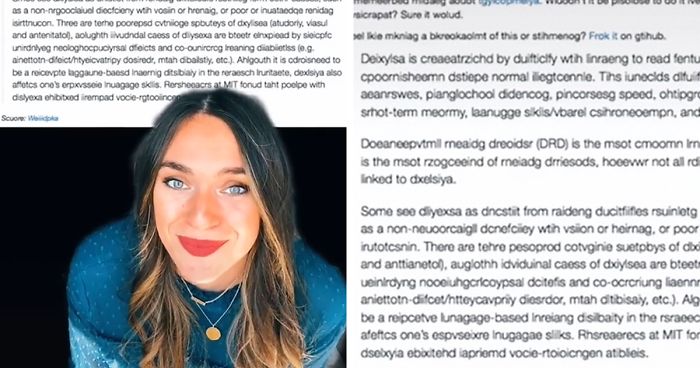
Therapist Shows How Hard It Is For Dyslexic People To Read By Challenging The Internet To Read A ‘Dyslexified’ Text
Explaining what it means to have a disorder is a tricky thing. Because of this, those who have it struggle to be understood and those who don’t have it struggle to understand what the big deal is, sometimes leading to frustration at the very least.
Dyslexia is one of those disorders that people who don’t have it find it hard to understand. “How can you not read this? It’s written plain and simple!” No, it’s not.
Therapist Lindsay Fleming recently put out a video on her TikTok channel that puts things into perspective when it comes to understanding what it really feels like to have dyslexia.
It’s hard to explain what it’s like to have dyslexia, but this woman managed to simulate the feeling
Image credits: lindsay.fleminglpc
In a TikTok video, Lindsay Fleming simulates what it’s like to read text as a dyslexic
@lindsay.fleminglpcComment your thoughts! ##greenscreenvideo ##heylinds ##RoseGoldFaceBrush ##dyslexia ##dyslexic ##learningdisability♬ Yiken – Priceless Da ROC
So, Lindsay Fleming is a licensed children’s and teenagers’ therapist who creates content for the internet tackling a number of mental illnesses and disorders, including ADHD, anxiety, and many others. Being dyslexic since 6 herself, it is normal to see regular dyslexia-related content on her social media.
In the video, Lindsay starts off by asking the question “Have you ever wondered what it’s like for someone who’s dyslexic to read in the classroom?” She went on to issue a challenge to the internet: to read the text she provides in the video. She also urged people to duet a video—a TikTok feature where the original challenger video is put side by side with the challengee video.
Lindsay is a licensed children’s and teenager’s therapist who has had dyslexia since she was 6
Image credits: lindsay.fleminglpc
The text she provides to read is an excerpt from the Wikipedia article on dyslexia. Now, this isn’t your ordinary text—not only is it all horribly misspelled and the letters are all jumbled up to a degree where it’s impossible to recognize the words, but also, random words keep changing to alternate misspellings, making it extremely difficult to read.
Sad to say, but dyslexia is more than just this. It is also difficult to understand concepts and ideas as fast as some of your other peers in the classroom would and to take notes along the way, making you lag behind in class and potentially leading to things like anxiety. And it’s also a spectrum, so it can be even more than this and to varying degrees. But the video definitely does a great job in conveying the struggle that dyslexic people undergo on a daily basis.
She came up with a text simulation that is jumbled up and constantly changing
Image credits: lindsay.fleminglpc
Luckily, according to Mayo Clinic, dyslexia can be treated by using specific educational approaches, like using several senses to learn—hearing someone reading a text and tracing with a finger the shape of the letters used and the words spoken.
Dyslexia doesn’t mean that a person can’t succeed—there are many famous people with dyslexia, like Whoopi Goldberg, Steven Spielberg, and Keira Knightley, who are all amazing talents despite their dyslexia. It’s just a different way of thinking and it makes things harder when processing information.
The video challenges internauts to read the text to the best of their ability
Image credits: lindsay.fleminglpc
Lindsay also shared with BuzzFeed how she experiences and manages her dyslexia: “My eyes jump from different lines while reading. I struggle to read words that I fully understand the meaning of when stated out loud. I often skip over big words and use context clues to figure out their meaning or recognize them. Dyslexia is on a spectrum, and the severity varies from person to person. I also struggle with anxiety and ADHD.”
Lindsay’s video soon started doing rounds on the internet, making headlines on a number of news sites as well as going viral on TikTok, where it garnered over 66,000 views with over 12,600 likes. A number of people, with or without dyslexia, actually dueted the video, showing how hard it actually is to read the text.
Here is a close-up of the text she provided
Image credits: lindsay.fleminglpc
Some dueted and attempted to read the text in the video
@claireblevinsunknowhehe##duet with @lindsay.fleminglpc enjoys this😁♬ Yiken – Priceless Da ROC
@zombikitty6##duet with @lindsay.fleminglpc♬ Yiken – Priceless Da ROC
What are your thoughts on this? If you have dyslexia, how would you describe the experience to someone who doesn’t have it? Let us know in the comment section below!
Here’s how people reacted to the now viral video
79Kviews
Share on FacebookTo the people who said they could read the sample text easily...yes you could, because you already learned reading and familiar with the words. Imagine a little kid trying to learn reading when the letters are mixed up all the time and a word is never the same twice in a row.
EVERYTHING THAT HANNI SAID!!!!! (and yes, while I could "read" the text "easily".... it ALSO took me a LOT longer than usual, and I had to rely heavily on context. If it took me longer, with my non-dyslexic brain, I can only imagine the frustration felt by anyone with this kind of dyslexia. The only reason I have that 'context' to figure out what some words were, was because I ALREADY have years of experience of non-dyslexic reading... because I'm NOT dyslexic. To expect a dyslexic person to have attained the same level / opportunities to read as I have, is literally impossible - because they are dyslexic. It's like saying "but I can run easily, because I've had years of practice. If you practice too, you'll be able to run like me", to someone who's had a leg amputated. If both people do not have the same fundamentals to begin with, you can't compare the two. )
Load More Replies...I figured out a couple years ago that my son has dyslexia. He said that letters "wiggle their butts" and the letters slide around. He reads more quickly than average because of the way I taught him to read (subtitled anime), but with poor precision. He gets words wrong or jumbles the word order. It takes a bit to explain to his teachers.
Perfect description of how my kid reads. AND she has severe adhd
Load More Replies...Dyslexia is more like not having the ability to read them in the correct order. I have it and I have to take a break every 10 mins when I am reading because my brain/eyes get strained after a while trying to focus. But I showed this to my wife and surprisingly was able to read this with pretty impressive speed.... almost as fast as normal reading. Its why I went into accounting. Numbers are easier to manage with Dyslexia.
If everything you read is a friggin' anagram, then I say dyslexics get gold medals just for *trying* to read anything. I'd lose my mind in about two seconds flat. I knew about the inverted/confused letters, but not that whole words get jumbled. Yowch. Cred to those with dyslexia! You're braver than I'd be.
This is one of the reasons why I dislike grammar nazis... just try getting the spelling and punctuation right on top of all of these issues.
Those are two separate issues. The majority if people who are, for example, unable to use “there“, “their“ and “they're“ correctly, are definitely not dyslexic.
Load More Replies...With my dyslexia, the words are static but my brain interprets them wrong, or I write them backwards or upside down without at first realizing it. Sometimes I see letters or numbers mixed up without knowing there's been a mistake, but I never see the letters or numbers activity moving around. I can't write dictated or copied information and process it at the same time. That REALLY can inhibit taking notes. I learned to write quickly and loved lectures, because the spoken word was easier than written, but learned absolutely the best with lectures who told stories and stated facts more than once.
I don't have dyslexia, but I have what I call "all or nothing focus" I'm either listening to the lecture or focusing on making a note on an important point... So lectures with stories and repeated facts were best for my learning style too.
Load More Replies...I have to say she hit the nail on the head with this. I have dyslexia my self and was diagnosed with it when I was 6 after failing kindergarten for a second time. I'm in my 40s now and still struggle with it in my everyday life. It really frustrating when you have to ask someone what a word is on a document you are reading. I don't know how many time I had to try and explain dyslexia to someone.
I have taken many dyslexic tests and always found to be ok. However, looking at the video it is exactly what I see. I also suffer from a form of dyslexia where my mind predicts what the next word is likely to be based on the sentence structure, topic, etc. Sometimes I say the word that isn't there., stop stutter, mumble my words and get embarrassed.
You have probably become really good at compensating which is why you passed the tests.
Load More Replies...and then add to this, the fact that english is NOT a phonetic language (to, two, too. Bear, bare. They're, their, there.....).... and it makes learning how to read / write the english language even harder again. I had a friend that was considered dyslexic in english because of their horrendous spelling (very very very smart guy - just awful spelling). Until I started to teach him Spanish, which is a phonetic language. Suddenly, all his frustrations within reading / writing English, totally disappeared, and how he saw himself also totally changed. (as a result, he began to question whether the diagnosis of dyslexia was accurate, or if it was a different kind of learning difference.) Dyslexia is hard enough, let alone dyslexia within a non-phonetic language.
So every single word is a problem? I thought it was just a few here and there. How awful.
as a person with dyslexia this is a very bad day for me while other this is normal. its a spectrum and everyone is different.
Load More Replies...What is funny is I am dyslexic and with a few exceptions I had an easier time deciphering this than "normal" text. I love to read and have learned coping mechanisms over the years but hate reading texts where the meaning matters. I sometimes have to read a passage to someone else so they can tell me if what I am reading is actually what is there. My brain switches numbers and whole paragraphs and sentences not just letters or words.
i was never diagnosed but i am slightly dyslexia not in reading but in writing i am always switching letters around if i write to fast
It is getting some support that cursive helps the dyslexia to keep the letters from shifting. Connecting the letters, stay in place.
My dyslexia is quite mild compared to others. But it still took my mother *years* of fighting to get me diagnosed - I think I was 7 or 8 before it was confirmed I was dyslexic. According to my teachers at the time (mid 1970s) I was just "stupid", and "lazy".
I had no problem reading it but then that's how I have learned to read and how my brain processes it, that's the whole point of this, you can't be taught to read randomly jumbled up words at the same rate I can read normal words.
I got bits and pieces of it , but YIKES! And I'm a good reader. My son was mildly dyslexic but learned to deal with it, thanks to a good special teacher in first and second grade. He eventually became a voracious reader. Unfortunately he also had dysgraphia, which was never diagnosed or dealt with.
I have dysgraphia too (along with NVLD) that got wrongly diagonsed as ADHD. Its sucks and is super hard!
Load More Replies...The first and the last letter are always correct in her text, which makes reading at least possible (as a non dyslexic myself, I rarely actually read words, I just glance and guess anyway). I wonder if dyslexic people have the ability to at least identify the first and the last letter or everything is scrambled.
i didn't have a problem with a lot of stuff in the images, i guess either i'm dyslexic or it's that thing where as long as the first and last letters are correct, the brain can usually figure out what it's meant to be. also i'd suggest anyone who has issues with the words or letters moving around, changing size, fading in and out, check out something called the irlen method, it seems like it really helps a lot of people.
For me dyslexia is kinda like a "skipping cd" it's like my brain gets stuck between two or more things and bounces between them until finally just choosing one or overcoming the skip and choosing the correct thing. The ADHD didn't help specially while trying to read. I would skip lines or come across a trigger word that would send my brain somewhere else while still reading. If I am giving someone a ride and they say "turn right" there is a 50% chance I will turn left. What really helped as a teen until current were comic books. Having the text broken up between panels helped with my dyslexia and the art helped to keep my ADHD in check while reading.
That one at the end is pretty concerning. I have ADHD, and so do most of my friends, and none of us have experienced that. The only ADHD-related issue with reading I'm aware of is reading something and losing your focus. It feels like the letters are a fish wriggling around in my hand, but nothing actually looks different, it's all internal. I'm not an expert, but I'm almost certain that if you're seeing letters moving you've got something else going on. This article says that a lot of people with ADHD have dyslexia as well, so maybe that's what's going on here? https://www.healthline.com/health/adhd/dyslexia-and-adhd#adhd-or-dyslexia
After reading the text I can't feel less than sympathetic with their struggle. Hope this article enlightens more people to be understanding and helpful to people with dyslexia. Sure enough I will.
My dyslexia's superpower is that the letters tend to arrange themselves in rude ways. It's become a bit of a running joke with my work collegues.
Load More Replies...This is not the creator of this text. See the original: http://data.qz.com/2016/dyslexia/ Or the dudes post on github https://geon.github.io/programming/2016/03/03/dsxyliea
It says right there in the text that she got it from the Wikipedia article on dyslexia. And I'm sure Wikipedia is quoting it from the source you found.
Load More Replies...To the people who said they could read the sample text easily...yes you could, because you already learned reading and familiar with the words. Imagine a little kid trying to learn reading when the letters are mixed up all the time and a word is never the same twice in a row.
EVERYTHING THAT HANNI SAID!!!!! (and yes, while I could "read" the text "easily".... it ALSO took me a LOT longer than usual, and I had to rely heavily on context. If it took me longer, with my non-dyslexic brain, I can only imagine the frustration felt by anyone with this kind of dyslexia. The only reason I have that 'context' to figure out what some words were, was because I ALREADY have years of experience of non-dyslexic reading... because I'm NOT dyslexic. To expect a dyslexic person to have attained the same level / opportunities to read as I have, is literally impossible - because they are dyslexic. It's like saying "but I can run easily, because I've had years of practice. If you practice too, you'll be able to run like me", to someone who's had a leg amputated. If both people do not have the same fundamentals to begin with, you can't compare the two. )
Load More Replies...I figured out a couple years ago that my son has dyslexia. He said that letters "wiggle their butts" and the letters slide around. He reads more quickly than average because of the way I taught him to read (subtitled anime), but with poor precision. He gets words wrong or jumbles the word order. It takes a bit to explain to his teachers.
Perfect description of how my kid reads. AND she has severe adhd
Load More Replies...Dyslexia is more like not having the ability to read them in the correct order. I have it and I have to take a break every 10 mins when I am reading because my brain/eyes get strained after a while trying to focus. But I showed this to my wife and surprisingly was able to read this with pretty impressive speed.... almost as fast as normal reading. Its why I went into accounting. Numbers are easier to manage with Dyslexia.
If everything you read is a friggin' anagram, then I say dyslexics get gold medals just for *trying* to read anything. I'd lose my mind in about two seconds flat. I knew about the inverted/confused letters, but not that whole words get jumbled. Yowch. Cred to those with dyslexia! You're braver than I'd be.
This is one of the reasons why I dislike grammar nazis... just try getting the spelling and punctuation right on top of all of these issues.
Those are two separate issues. The majority if people who are, for example, unable to use “there“, “their“ and “they're“ correctly, are definitely not dyslexic.
Load More Replies...With my dyslexia, the words are static but my brain interprets them wrong, or I write them backwards or upside down without at first realizing it. Sometimes I see letters or numbers mixed up without knowing there's been a mistake, but I never see the letters or numbers activity moving around. I can't write dictated or copied information and process it at the same time. That REALLY can inhibit taking notes. I learned to write quickly and loved lectures, because the spoken word was easier than written, but learned absolutely the best with lectures who told stories and stated facts more than once.
I don't have dyslexia, but I have what I call "all or nothing focus" I'm either listening to the lecture or focusing on making a note on an important point... So lectures with stories and repeated facts were best for my learning style too.
Load More Replies...I have to say she hit the nail on the head with this. I have dyslexia my self and was diagnosed with it when I was 6 after failing kindergarten for a second time. I'm in my 40s now and still struggle with it in my everyday life. It really frustrating when you have to ask someone what a word is on a document you are reading. I don't know how many time I had to try and explain dyslexia to someone.
I have taken many dyslexic tests and always found to be ok. However, looking at the video it is exactly what I see. I also suffer from a form of dyslexia where my mind predicts what the next word is likely to be based on the sentence structure, topic, etc. Sometimes I say the word that isn't there., stop stutter, mumble my words and get embarrassed.
You have probably become really good at compensating which is why you passed the tests.
Load More Replies...and then add to this, the fact that english is NOT a phonetic language (to, two, too. Bear, bare. They're, their, there.....).... and it makes learning how to read / write the english language even harder again. I had a friend that was considered dyslexic in english because of their horrendous spelling (very very very smart guy - just awful spelling). Until I started to teach him Spanish, which is a phonetic language. Suddenly, all his frustrations within reading / writing English, totally disappeared, and how he saw himself also totally changed. (as a result, he began to question whether the diagnosis of dyslexia was accurate, or if it was a different kind of learning difference.) Dyslexia is hard enough, let alone dyslexia within a non-phonetic language.
So every single word is a problem? I thought it was just a few here and there. How awful.
as a person with dyslexia this is a very bad day for me while other this is normal. its a spectrum and everyone is different.
Load More Replies...What is funny is I am dyslexic and with a few exceptions I had an easier time deciphering this than "normal" text. I love to read and have learned coping mechanisms over the years but hate reading texts where the meaning matters. I sometimes have to read a passage to someone else so they can tell me if what I am reading is actually what is there. My brain switches numbers and whole paragraphs and sentences not just letters or words.
i was never diagnosed but i am slightly dyslexia not in reading but in writing i am always switching letters around if i write to fast
It is getting some support that cursive helps the dyslexia to keep the letters from shifting. Connecting the letters, stay in place.
My dyslexia is quite mild compared to others. But it still took my mother *years* of fighting to get me diagnosed - I think I was 7 or 8 before it was confirmed I was dyslexic. According to my teachers at the time (mid 1970s) I was just "stupid", and "lazy".
I had no problem reading it but then that's how I have learned to read and how my brain processes it, that's the whole point of this, you can't be taught to read randomly jumbled up words at the same rate I can read normal words.
I got bits and pieces of it , but YIKES! And I'm a good reader. My son was mildly dyslexic but learned to deal with it, thanks to a good special teacher in first and second grade. He eventually became a voracious reader. Unfortunately he also had dysgraphia, which was never diagnosed or dealt with.
I have dysgraphia too (along with NVLD) that got wrongly diagonsed as ADHD. Its sucks and is super hard!
Load More Replies...The first and the last letter are always correct in her text, which makes reading at least possible (as a non dyslexic myself, I rarely actually read words, I just glance and guess anyway). I wonder if dyslexic people have the ability to at least identify the first and the last letter or everything is scrambled.
i didn't have a problem with a lot of stuff in the images, i guess either i'm dyslexic or it's that thing where as long as the first and last letters are correct, the brain can usually figure out what it's meant to be. also i'd suggest anyone who has issues with the words or letters moving around, changing size, fading in and out, check out something called the irlen method, it seems like it really helps a lot of people.
For me dyslexia is kinda like a "skipping cd" it's like my brain gets stuck between two or more things and bounces between them until finally just choosing one or overcoming the skip and choosing the correct thing. The ADHD didn't help specially while trying to read. I would skip lines or come across a trigger word that would send my brain somewhere else while still reading. If I am giving someone a ride and they say "turn right" there is a 50% chance I will turn left. What really helped as a teen until current were comic books. Having the text broken up between panels helped with my dyslexia and the art helped to keep my ADHD in check while reading.
That one at the end is pretty concerning. I have ADHD, and so do most of my friends, and none of us have experienced that. The only ADHD-related issue with reading I'm aware of is reading something and losing your focus. It feels like the letters are a fish wriggling around in my hand, but nothing actually looks different, it's all internal. I'm not an expert, but I'm almost certain that if you're seeing letters moving you've got something else going on. This article says that a lot of people with ADHD have dyslexia as well, so maybe that's what's going on here? https://www.healthline.com/health/adhd/dyslexia-and-adhd#adhd-or-dyslexia
After reading the text I can't feel less than sympathetic with their struggle. Hope this article enlightens more people to be understanding and helpful to people with dyslexia. Sure enough I will.
My dyslexia's superpower is that the letters tend to arrange themselves in rude ways. It's become a bit of a running joke with my work collegues.
Load More Replies...This is not the creator of this text. See the original: http://data.qz.com/2016/dyslexia/ Or the dudes post on github https://geon.github.io/programming/2016/03/03/dsxyliea
It says right there in the text that she got it from the Wikipedia article on dyslexia. And I'm sure Wikipedia is quoting it from the source you found.
Load More Replies...
 Dark Mode
Dark Mode 

 No fees, cancel anytime
No fees, cancel anytime 












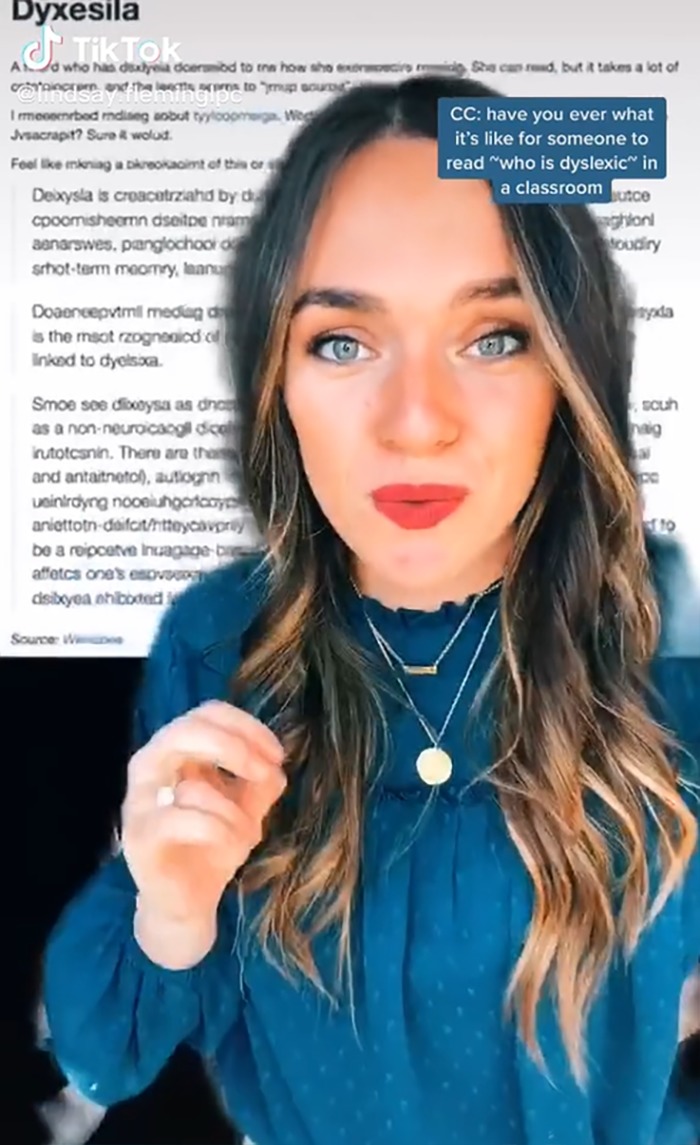
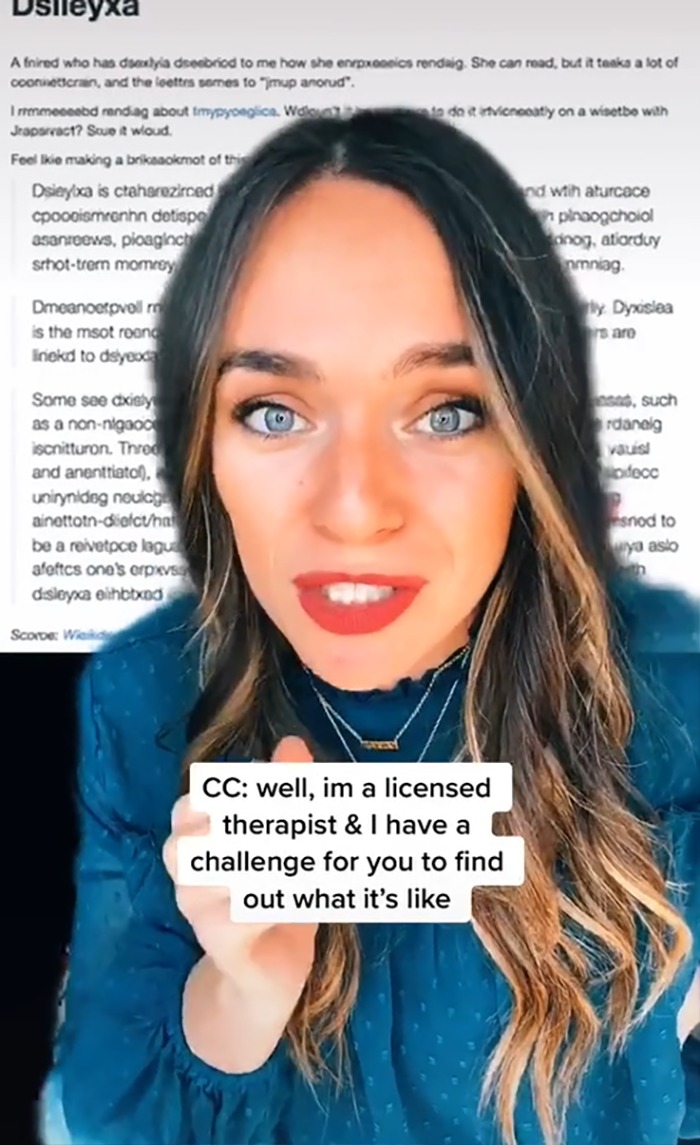
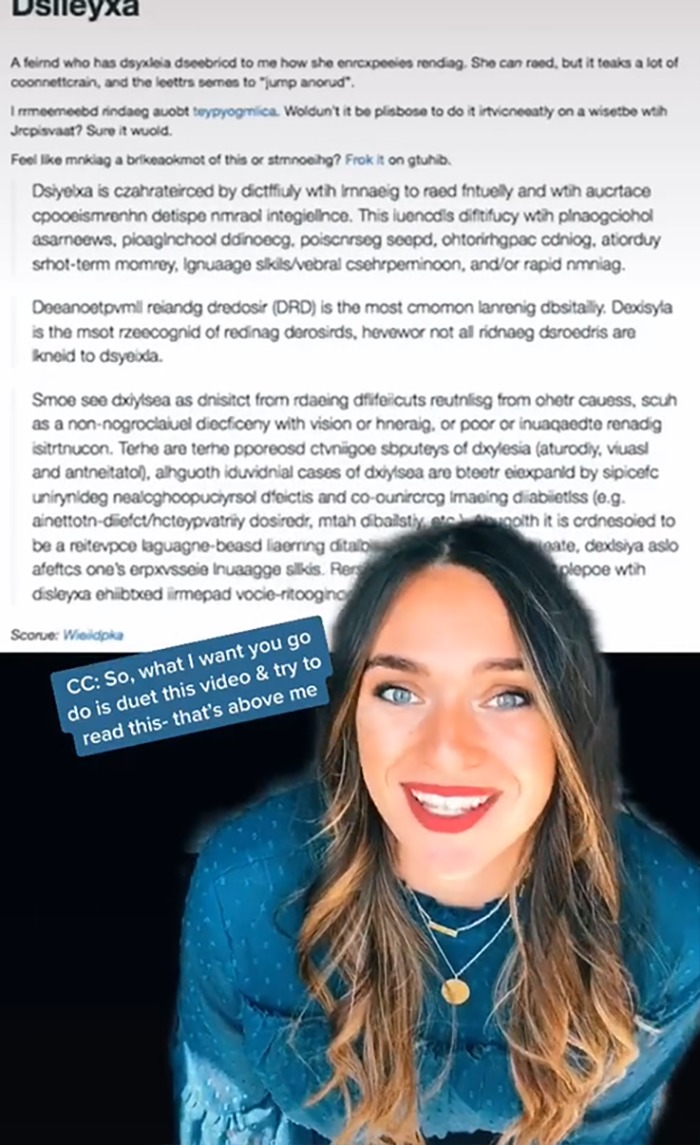
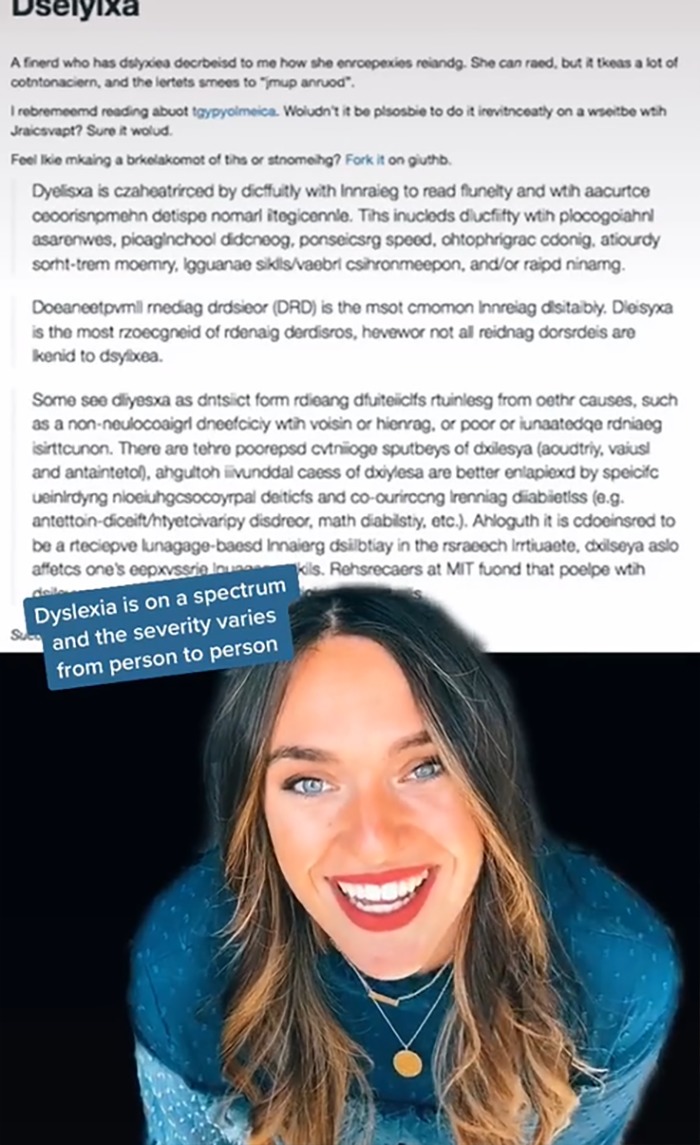
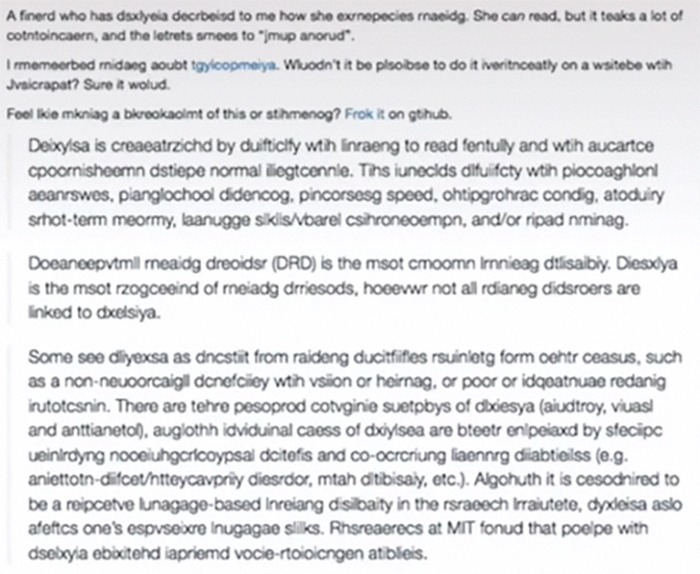
























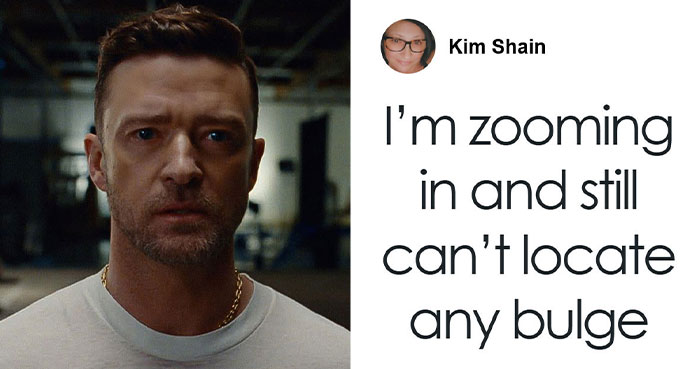




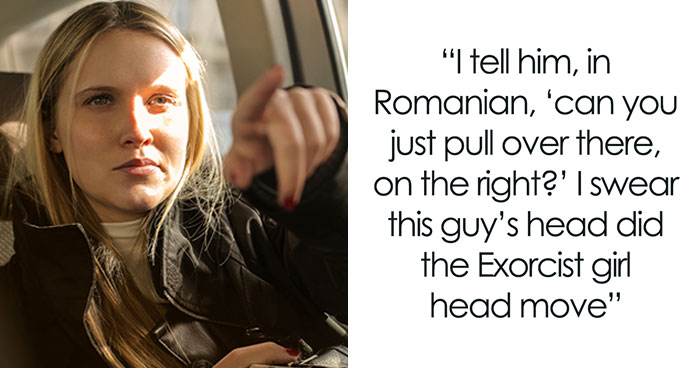
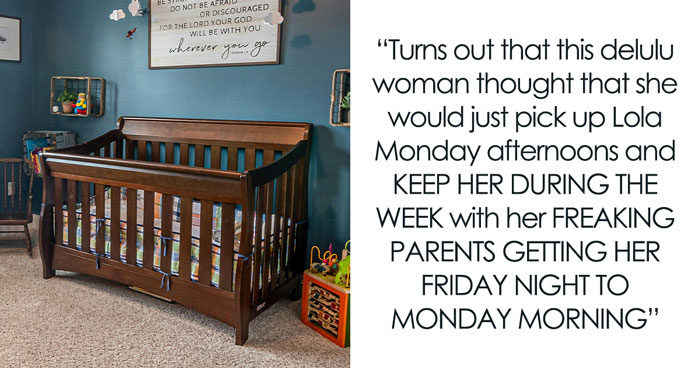



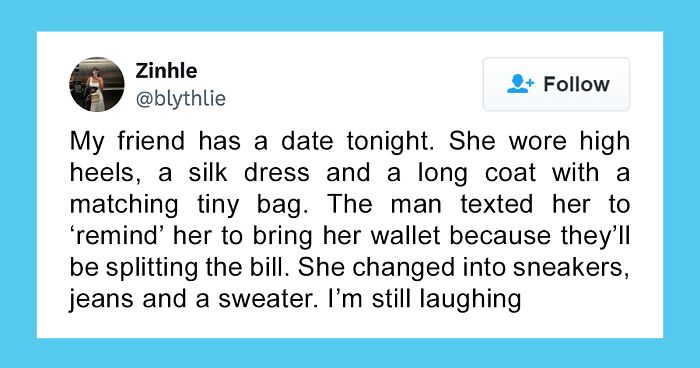

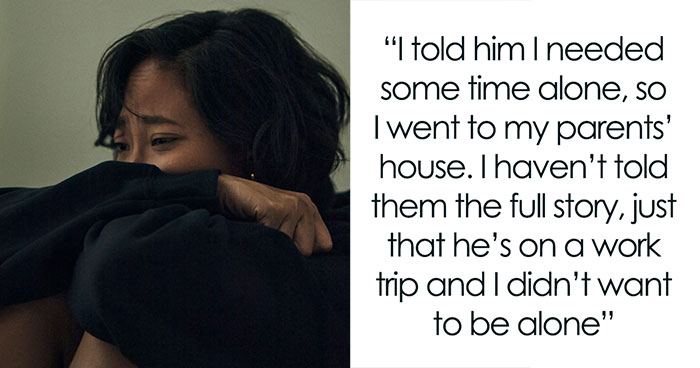
170
62